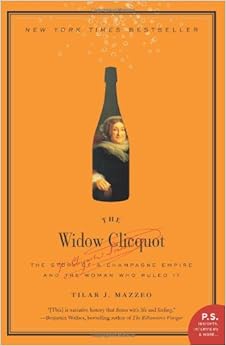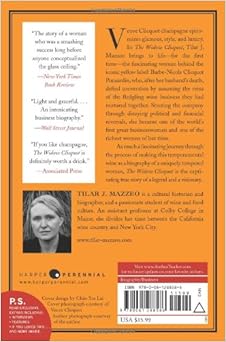Amazon Best of the Month, October 2008: With its trademark fizz and sparkling taste, champagne has long been the beverage of choice for those in a celebratory mood. From the artillery of popping corks on New Year's Eve to the clinking of newlywed glasses, a bit of the bubbly has locked arms with good cheer for centuries. Yet had it not been for the pioneering Barbe-Nicole Ponsardin, the libation deemed "the wine of civilization" by Winston Churchill might today be available only to the excessively wealthy or extremely lucky. Author Tilar J. Mazzeo toasts the élan of Champagne's Grand Dame with
The Widow Clicquot, a fascinating story of the cunning bravery and good fortune that helped build the Veuve Clicquot brand. Widowed at age twenty-seven by the death of her husband François Clicquot, Barbe-Nicole assumed control of her family’s wine business amid the chaos of The Napoleonic Wars. That she became a prominent female leader in a male-dominated industry was one thing; building an empire amid savage political unrest was quite another. With passionate research and true admiration for her subject, Mazzeo pays homage to the beloved Widow from Reims and the remarkable weight her name still carries today.
-Dave Callanan
--This text refers to the
Hardcover
edition.
“Joan of Arc and Madame Clicquot were the two women heroes I knew when growing up in France. What a gift to have this new, well-researched biography of one of the world’s first ‘legitimate’ businesswoman, our contemporary as a global business leader.” (Mireille Guiliano, author of the New York Times #1 bestseller, French Women Don't Get Fat)
“The Widow Clicquot is someone we should all know about.... Long a shadowy, legend-obscured figure, in Tilar Mazzeo’s agile hands the widow sheds her weeds and takes form before our eyes as a distinctly modern entrepreneur....The result is narrative history that fizzes with life and feeling.” (Benjamin Wallace, author of the New York Times bestseller, The Billionaire's Vinegar)
“Told in a light and graceful style that is just right for its subject…. [I]t’s a fascinating trip, made even more so by Ms. Mazzeo’s charming cameo appearances as a kind of tour guide…. This example of Barbe-Nicole’s voice is exceptional…an intoxicating business biography.” (Julia Flynn Siler, The Wall Street Journal)
“The Widow Clicquot, Tilar J. Mazzeo’s sweeping oenobiography of Barbe-Nicole Clicquot Ponsardin, is the story of a woman who was a smashing success long before anyone conceptualized the glass ceiling.” (New York Times Book Review)
“Mazzeo’s resulting book is an enticing stew of biography and history.” (USA Today)
“If you like champagne, “The Widow Clicquot” by Tilar J. Mazzeo is definitely worth a drink.” (Associated Press)
“Tilar J. Mazzeo’s informed and enlightening biography of Madame Clicquot, the widow and, more important, the businesswoman, retrieves her vintage story as if looking for a rare bottle in one of the Champagne region’s deepest caves.” (Newsday)
“This book is full of fascinating morsels of information.” (Canberra Times)
The Widow Clicquot is a miraculous feat of organization, one worthy of a doctoral thesis…. [I]n its moments of action, this is actually a gripping story. And while the book appears to be a feminist history/business biography, it’s also the appealing story of the author’s odyssey. (Austin Chronicle)
“Mazzeo’s tale moves swiftly through Barbe-Nicole’s many accomplishments, including her method for storing bottles nose-down—an innovation that allowed the second fermentation detritus to be cleared efficiently, setting her far ahead of her competitors.” (Los Angeles Times)







